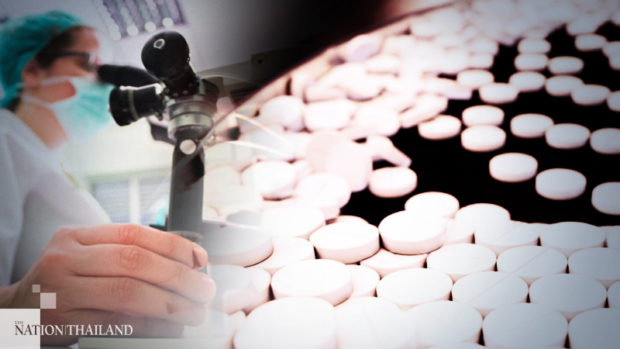Thailand goes full steam ahead in hunt for COVID-19 vaccine
BANGKOK — Several health organizations in Thailand and other countries have speeded up operations to find a way of dealing with the Covid-19 contagion, with up to 70 candidate vaccines being developed by companies registered with the World Health Organization (WHO).
Vitoon Vonghangool, president of Thailand’s BioNet-Asia, said if the vaccine currently being tested on rats proves to be effective, tests on humans will be held before it is put in for registration with the Food and Drug Administration (FDA).
“This operation will be under the supervision of the Public Health Ministry, though the progress will also be reported to WHO,” he said.
He added that the company has spent about Bt200 million on materials for the vaccine development, and expects to spend another Bt1 billion on human trials and to register with the FDA.
“We initially aimed to only produce the vaccine for medical personnel before cooperating with the authorities to expand the production,” he said.
Article continues after this advertisementDr Nakorn Premsir, director of the National Vaccine Institute (NVI), said the institute has signed a contract with a leading university in China to conduct tests on the vaccine, which should be completed in the second half of this year.
Article continues after this advertisement“This university has already developed many vaccines,” he said. “We are also negotiating cooperation in vaccine development with other organizations in China, South Korea, Japan, US, and Germany.”
He added that NVI in collaboration with the National Research Council of Thailand (NRCT) has granted funds for vaccine research in Thailand as well.
Meanwhile, Dr Marut Jirasetthasiri, director-general of Thai Traditional and Alternative Medicine Department, has said that the herb kariyat (Andrographis Paniculata) is believed to ease the symptoms of Covid-19.
“The department’s human research ethics committee will first consider this before it is proposed to the Bamrasnaradura Infectious Diseases Institute’s human research ethics committee within this week,” he said, adding that the herb will be tested on six patients for five days first.
“We will study the patients’ symptoms, safety and effectiveness,” he said. “The department will also cooperate with the Chulabhorn Research Institute to investigate the cause of lung and heart failure in Covid-19 patients.”
Dr Yong Poovorawan, an expert virologist at Chulalongkorn University, said that of 230 people who have recovered from Covid-19, eight are eligible to donate blood plasma.
“Each former patient can donate up to 600cc of plasma based on their body weight. Up to three 250cc bags of blood plasma will be needed to treat one Covid-19 patient,” he said.
He added that the donors must be between 17 and 60 in age, weigh more than 50 kilograms and must be free of chronic conditions such as heart disease, diabetes or high-blood pressure.
“The donors must also test negative for Covid-19,” he added.
Separately, Sirikul Matevelungsun, deputy managing director of the Government Pharmaceutical Organization (GPO), said that Thailand is set to receive 303,860 tablets of Favipiravir within May.
“Of the shipment, 103,860 tablets will come from Japan, which was originally scheduled to be delivered in April, while another 200,000 tablets will come from China,” she said.
“GPO and the Department of Disease Control recently procured 187,000 tablets of Favipiravir from different sources.”
For more news about the novel coronavirus click here.
What you need to know about Coronavirus.
For more information on COVID-19, call the DOH Hotline: (02) 86517800 local 1149/1150.
The Inquirer Foundation supports our healthcare frontliners and is still accepting cash donations to be deposited at Banco de Oro (BDO) current account #007960018860 or donate through PayMaya using this link.
